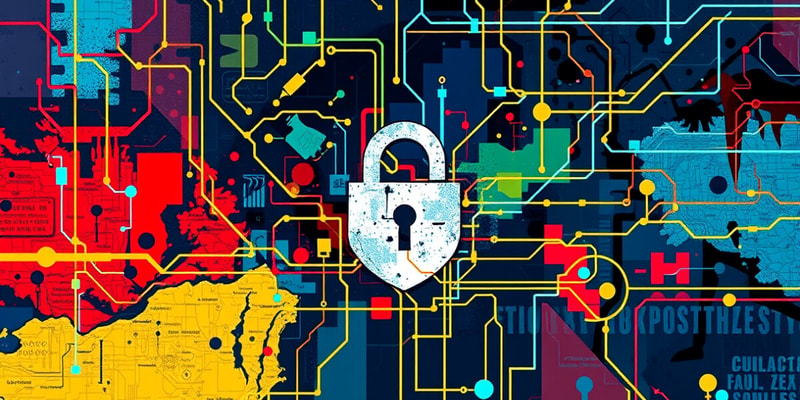Podcast
Questions and Answers
What is the Purpose Limitation Obligation in relation to personal data?
What is the Purpose Limitation Obligation in relation to personal data?
Which of the following is NOT a legal basis for processing personal data under the PDPA?
Which of the following is NOT a legal basis for processing personal data under the PDPA?
What does the Accuracy Obligation require organizations to do?
What does the Accuracy Obligation require organizations to do?
What is required of organizations when transferring personal data to other organizations?
What is required of organizations when transferring personal data to other organizations?
Signup and view all the answers
Which of the following best describes the Retention Limitation Obligation?
Which of the following best describes the Retention Limitation Obligation?
Signup and view all the answers
Which type of organizations does the PDPA apply to?
Which type of organizations does the PDPA apply to?
Signup and view all the answers
What is meant by Data Minimisation in the context of data obligations?
What is meant by Data Minimisation in the context of data obligations?
Signup and view all the answers
What does “written law” refer to in the context of the PDPA?
What does “written law” refer to in the context of the PDPA?
Signup and view all the answers
What does the PDPA specifically not confer regarding personal data?
What does the PDPA specifically not confer regarding personal data?
Signup and view all the answers
Which of the following is NOT covered as personal data under the PDPA?
Which of the following is NOT covered as personal data under the PDPA?
Signup and view all the answers
Which term refers to organizations that process personal data on behalf of another organization under the PDPA?
Which term refers to organizations that process personal data on behalf of another organization under the PDPA?
Signup and view all the answers
In the concept of the PDPA, who generally holds responsibility for personal data processed by data intermediaries?
In the concept of the PDPA, who generally holds responsibility for personal data processed by data intermediaries?
Signup and view all the answers
What is the effect of the PDPA when there is a conflict with another written law?
What is the effect of the PDPA when there is a conflict with another written law?
Signup and view all the answers
Which of the following is a requirement that is NOT placed on data intermediaries under the PDPA?
Which of the following is a requirement that is NOT placed on data intermediaries under the PDPA?
Signup and view all the answers
Which individual does the PDPA define as an 'individual'?
Which individual does the PDPA define as an 'individual'?
Signup and view all the answers
How does the PDPA describe the term 'processing'?
How does the PDPA describe the term 'processing'?
Signup and view all the answers
What determines the legal bases for processing personal data under the Personal Data Protection Act 2012 (PDPA)?
What determines the legal bases for processing personal data under the Personal Data Protection Act 2012 (PDPA)?
Signup and view all the answers
Which of the following topics is NOT covered in Unit 2: Cybersecurity?
Which of the following topics is NOT covered in Unit 2: Cybersecurity?
Signup and view all the answers
The enforcement of the PDPA includes which of the following?
The enforcement of the PDPA includes which of the following?
Signup and view all the answers
Which act primarily regulates the protection against online threats and falsehoods?
Which act primarily regulates the protection against online threats and falsehoods?
Signup and view all the answers
What does PDPC stand for in the context of data governance?
What does PDPC stand for in the context of data governance?
Signup and view all the answers
Cybersecurity incidents are primarily prevented under which regulation?
Cybersecurity incidents are primarily prevented under which regulation?
Signup and view all the answers
What is the purpose of the PDPC’s Model AI Governance Framework?
What is the purpose of the PDPC’s Model AI Governance Framework?
Signup and view all the answers
Which of the following is a key component of the obligations of organizations under PDPA?
Which of the following is a key component of the obligations of organizations under PDPA?
Signup and view all the answers
What must organisations do when an individual exercises their right to withdraw consent under PDPA section 16?
What must organisations do when an individual exercises their right to withdraw consent under PDPA section 16?
Signup and view all the answers
Which rights are included under the rights of individuals in relation to personal data?
Which rights are included under the rights of individuals in relation to personal data?
Signup and view all the answers
When might an organisation be allowed to continue data collection without consent?
When might an organisation be allowed to continue data collection without consent?
Signup and view all the answers
What is a key characteristic of the right to data portability under PDPA?
What is a key characteristic of the right to data portability under PDPA?
Signup and view all the answers
What defines the scope of the individuals' private right of action under the PDPA?
What defines the scope of the individuals' private right of action under the PDPA?
Signup and view all the answers
What obligation do organisations have when processing requests for access to or correction of personal data?
What obligation do organisations have when processing requests for access to or correction of personal data?
Signup and view all the answers
In the context of the PDPA, what is the implication of section 48O regarding private action?
In the context of the PDPA, what is the implication of section 48O regarding private action?
Signup and view all the answers
In the Michael Reed v. Alex Bellingham case, what aspect of the PDPA was primarily addressed?
In the Michael Reed v. Alex Bellingham case, what aspect of the PDPA was primarily addressed?
Signup and view all the answers
What power does the PDPC not have under the PDPA provisions?
What power does the PDPC not have under the PDPA provisions?
Signup and view all the answers
Under what circumstances can an organization apply for reconsideration of a PDPC decision?
Under what circumstances can an organization apply for reconsideration of a PDPC decision?
Signup and view all the answers
What is one reason why organizations may choose to anonymise personal data?
What is one reason why organizations may choose to anonymise personal data?
Signup and view all the answers
What is a potential outcome if an organization fails to comply with a PDPC direction?
What is a potential outcome if an organization fails to comply with a PDPC direction?
Signup and view all the answers
Which of the following is most likely NOT a focus area for PDPA provisions?
Which of the following is most likely NOT a focus area for PDPA provisions?
Signup and view all the answers
What constitutes a voluntary undertaking under the PDPA?
What constitutes a voluntary undertaking under the PDPA?
Signup and view all the answers
What must an organization demonstrate when seeking consent for the use of cookies?
What must an organization demonstrate when seeking consent for the use of cookies?
Signup and view all the answers
How does the PDPC characterize anonymised data?
How does the PDPC characterize anonymised data?
Signup and view all the answers
Study Notes
Module Introduction
- This module includes 4 units focusing on: data protection, cybersecurity, regulation of AI and data processing, prevention of online threats and falsehoods.
- The Personal Data Protection Act 2012 (PDPA) governs the collection, use, and disclosure of personal data by organizations.
- The Cybersecurity Act 2018 (CYSA) regulates cybersecurity.
Purpose and Scope of the PDPA
- The PDPA recognizes the importance of protecting personal data and the needs of organizations.
- It applies to organizations, including companies, associations, and bodies of persons, regardless of their location.
- It does not apply to individuals acting in a personal capacity, employees, or public agencies.
- Personal data refers to data about an identifiable individual, including factual information and opinions.
- Data intermediaries (DIs) process personal data on behalf of other organizations (data controllers).
- Data controllers (DCs) are organizations responsible for personal data processed by their data intermediaries.
Obligations of Organizations
- Organizations must comply with the PDPA by obtaining consent for the collection, use, and disclosure of personal data or by invoking other lawful bases for processing.
- They must ensure the data they collect is accurate, relevant, and minimized to the purposes of collection.
- Organizations are obligated to protect personal data and promptly notify individuals and the Personal Data Protection Commission (PDPC) of data breaches.
- Organizations must implement data governance measures.
Rights of Individuals
- Individuals have the right to withdraw consent for the collection, use, and disclosure of their personal data.
- They have the right to access and correct their personal data.
- The PDPA also includes the right to data portability and a right of private action.
Enforcement of the PDPA
- The PDPC has the power to investigate complaints and enforce the PDPA.
- Enforcement actions include issuing directions, requiring payment of financial penalties, and accepting voluntary undertakings.
- Individuals and organizations can apply for reconsideration or appeal PDPC decisions.
Specific Topics
- The PDPA applies to various topics, including analytics and research, anonymization, online activities, and cloud services.
- Organizations need to anonymize personal data to protect individuals' privacy.
- Online activities can involve the collection and use of personal data, requiring organizations to comply with the PDPA.
- Companies using cloud services need to ensure the protection of personal data stored on these platforms.
Studying That Suits You
Use AI to generate personalized quizzes and flashcards to suit your learning preferences.
Related Documents
Description
This quiz covers key concepts related to data protection, cybersecurity regulations, and the implications of the Personal Data Protection Act 2012 and the Cybersecurity Act 2018. Assess your understanding of how these laws apply to organizations and the importance of safeguarding personal data. Get ready to explore prevention strategies for online threats and misinformation.




